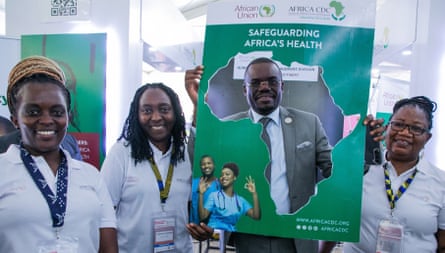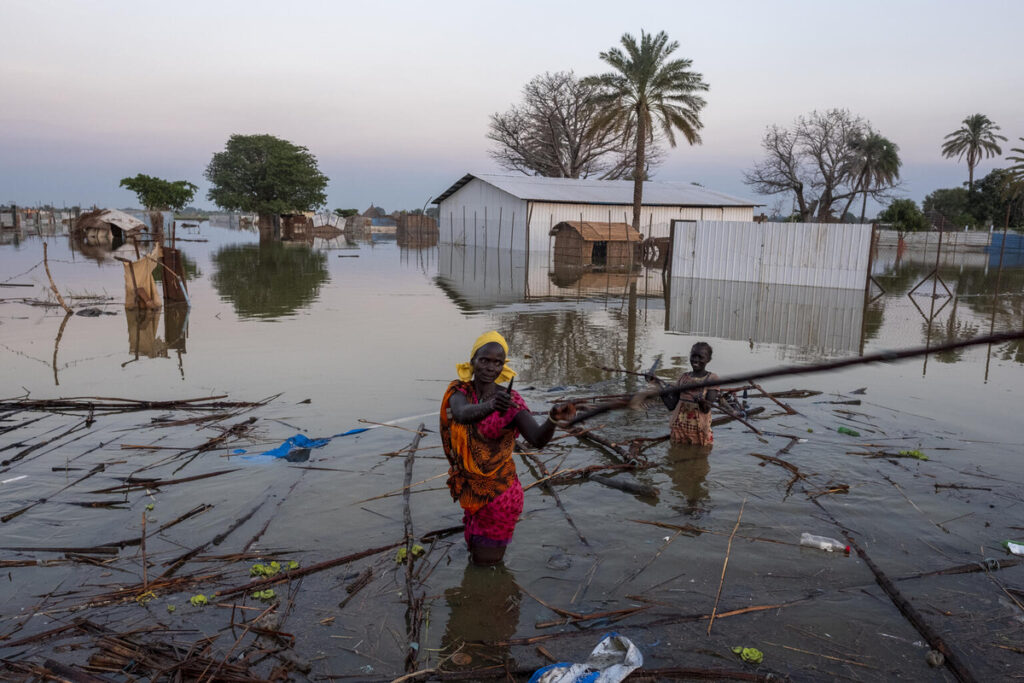Continent must have more resilient health systems and local vaccine manufacturing to prevent next pandemic, says public health body
Africa’s leading public health body is using the first ever health day at Cop on 3 December to call for increased funding to fight the health impacts of the climate crisis on the continent and create more resilient systems to ensure it is prepared for the next pandemic.
The Africa Centres for Disease Control and Prevention (Africa CDC) launched the second phase of its three-year, $1.5bn Saving Lives and Livelihoods drive this week, but its director general, Dr Jean Kaseya, said multiple disease outbreaks combined with the growing burden of non-communicable diseases and recovery from Covid means that much more financial support is needed.
“We want our partners to understand that in Africa we are doing our best to provide funding to tackle these issues but we need more money from multilateral mechanisms such as the [World Bank] pandemic fund, [the US aid fund] Pepfar and the Global Fund,” said Kaseya.
“Between January and November 2023, Africa faced 158 disease outbreaks. These come immediately after Covid when economies were almost destroyed. Now countries have to respond to these outbreaks.”
He added that the climate crisis is a leading contributor to the problem, including the current rise in cholera cases. “Today we have 18 countries affected by cholera with 4,000 deaths; we have dengue in west Africa killing people.”
He added that Africa needed a resilient health system to be able to cope with every outbreak. “Each outbreak we miss can become a pandemic – and that is the major concern we have today. We don’t want the next pandemic to come from Africa due to climate change. This is why we are pushing for more funding.”
The 2013-2016 Ebola epidemic as well as Covid revealed the extent of Africa’s health insecurity, said Kaseya, and highlighted the need for African manufacturers of vaccines and other medicines. Speaking this week at the Conference on Public Health in Africa in Lusaka, Zambia, Kaseya likened the drive for local manufacturing to “Africa’s second independence”.
“When we had Covid, we discovered that Africa was abandoned. We saw we were not independent. Africa begged the world to get even masks and gloves.”
Only 1% of vaccines used in Africa come from suppliers on the continent. Africa CDC’s goal is that by 2040 at least 60% of all vaccines used in Africa will be home-produced.
“[Local manufacturing] will build our economy; it will create jobs; it will be an opportunity for innovation, and it will contribute to peace and security because we know when people have jobs and access to a number of commodities they are not fighting,” said Kaseya.

Africa CDC is also supporting a drive to train thousands of new health workers to fill gaps in expertise. “Less than 10% of African countries are able to respond to a major outbreak with a skilled health workforce,” said Kaseya. “Africa requires 6,000 field epidemiologists, yet we currently only have 1,900. Additionally, the continent needs 25,000 frontline epidemiologists, but we presently have just 5,000.”
National governments are being encouraged to finance Africa CDC’s vision for a resilient health system across the continent, but budgets vary widely from country to country, and Covid and the climate crisis have taken a toll on economies.
“My message to Cop28 is we want Africa to be heard. We want to say: ‘Listen, we are bringing evidence on how climate change is affecting us directly and indirectly.’ Every year Africa is losing 5 to 15% in GDP from climate change. When you are losing that you don’t have enough [budget] for health,” said Kaseya.
Source: The Guardian


